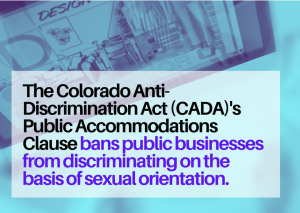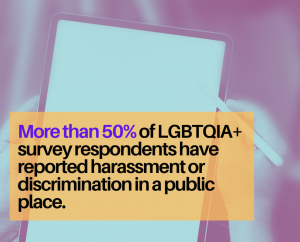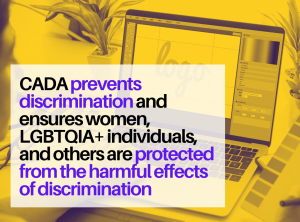by Ashley Chan, 2022 Summer Intern
IANGEL has joined the National Women’s Law Center’s amicus curiae brief in 303 Creative LLC v. Elenis, to support the rights of the LGBTQ+ community to be free from discrimination by public businesses. Below, we break down the case and summarize the NWLC’s brief and arguments.
What is 303 Creative LLC v. Elenis about?
 Lorie Smith, the owner of 303 Creative, a graphic design firm, was looking to expand her business to include wedding websites in its offered services. Smith, a Christian, opposes same-sex marriage based on her religious beliefs and wanted to deny website design services to LGBTQ couples. Smith also wished to express in a statement on the firm’s website that creating wedding websites for same-sex couples would compromise her religious beliefs. However, the Colorado Anti-Discrimination Act (CADA) prohibits Smith from doing so. CADA’s Public Accommodations Clause bans public businesses from discriminating on the basis of sexual orientation. CADA’s Communications Clause forbids the publication of messages that announce an intent to deny services on the basis of an individual’s sexual orientation or protected status. Smith sued in federal court, seeking a preliminary injunction. While the Tenth Circuit found Smith’s creation of wedding websites to be “pure speech” and CADA to compel Smith to create speech against her will, they found that CADA is constitutional as the law is narrowly tailored to Colorado’s interest in ensuring LGBTQIA+ individuals have access to the unique services 303 Creative offers. The U.S. Supreme Court granted review of the 10th Circuit’s decision and this Amicus brief will be filed with SCOTUS.
Lorie Smith, the owner of 303 Creative, a graphic design firm, was looking to expand her business to include wedding websites in its offered services. Smith, a Christian, opposes same-sex marriage based on her religious beliefs and wanted to deny website design services to LGBTQ couples. Smith also wished to express in a statement on the firm’s website that creating wedding websites for same-sex couples would compromise her religious beliefs. However, the Colorado Anti-Discrimination Act (CADA) prohibits Smith from doing so. CADA’s Public Accommodations Clause bans public businesses from discriminating on the basis of sexual orientation. CADA’s Communications Clause forbids the publication of messages that announce an intent to deny services on the basis of an individual’s sexual orientation or protected status. Smith sued in federal court, seeking a preliminary injunction. While the Tenth Circuit found Smith’s creation of wedding websites to be “pure speech” and CADA to compel Smith to create speech against her will, they found that CADA is constitutional as the law is narrowly tailored to Colorado’s interest in ensuring LGBTQIA+ individuals have access to the unique services 303 Creative offers. The U.S. Supreme Court granted review of the 10th Circuit’s decision and this Amicus brief will be filed with SCOTUS.
What is the constitutional issue?
Whether applying a public-accommodation law to compel an artist to speak or stay silent violates the Free Speech Clause of the First Amendment.
The Amicus Brief’s Position in Support of Respondents
Applying a public accommodation law to compel an artist to speak or stay silent does not violate the Free Speech Clause of the First Amendment. Neither the application of the Public Accommodations Clause nor the Communications Clause of the Colorado Anti-Discrimination Act violates Ms. Smith’s First Amendment free speech right.
Summary of the Amici Curiae Brief
 First, the brief argues that public accommodations laws, such as CADA, are necessary to protect women, LGBTQIA+ folks, and others from discrimination based on their protected statuses because those groups face a long history of discrimination and public accommodations laws such as CADA prevent discrimination. American women have long been excluded from public places, accommodations, and economic/commercial activities due to archaic and patriarchal beliefs and traditions that relegated women solely to the rules and confines of wife and mother. Their exclusion and this de jure sex discrimination, spanning decades, served as the basis and mechanism for maintaining and promoting continued economic and dignitary inequality of women. Sex-based discrimination remains today, and women continue to suffer from the harm of sex-based discrimination, demonstrating the importance and necessity of public accommodations laws. 4 in 10 working women have experienced some form of sex-based discrimination in the workplace. LGBTQIA+ folks have similarly faced discrimination, with more than 50% of LGBTQIA+ survey respondents reporting harassment or discrimination in a public place. LGBTQIA+ youth are 2.2 times more likely to be homeless than their straight counterparts, and Black LGBTQIA+ youth suffer the highest rates of homelessness. Without public accommodation laws, the discrimination LGBTQIA+ folks face and associated economic harm will be exacerbated. For LGBTQIA+ individuals with intersecting identities who face coupled discrimination, public accommodation laws serve an even more crucial role.
First, the brief argues that public accommodations laws, such as CADA, are necessary to protect women, LGBTQIA+ folks, and others from discrimination based on their protected statuses because those groups face a long history of discrimination and public accommodations laws such as CADA prevent discrimination. American women have long been excluded from public places, accommodations, and economic/commercial activities due to archaic and patriarchal beliefs and traditions that relegated women solely to the rules and confines of wife and mother. Their exclusion and this de jure sex discrimination, spanning decades, served as the basis and mechanism for maintaining and promoting continued economic and dignitary inequality of women. Sex-based discrimination remains today, and women continue to suffer from the harm of sex-based discrimination, demonstrating the importance and necessity of public accommodations laws. 4 in 10 working women have experienced some form of sex-based discrimination in the workplace. LGBTQIA+ folks have similarly faced discrimination, with more than 50% of LGBTQIA+ survey respondents reporting harassment or discrimination in a public place. LGBTQIA+ youth are 2.2 times more likely to be homeless than their straight counterparts, and Black LGBTQIA+ youth suffer the highest rates of homelessness. Without public accommodation laws, the discrimination LGBTQIA+ folks face and associated economic harm will be exacerbated. For LGBTQIA+ individuals with intersecting identities who face coupled discrimination, public accommodation laws serve an even more crucial role.
In previous cases, the Court has recognized that ending sex discrimination through public accommodation laws is a compelling interest “of the highest order”, understanding that sex classifications perpetuate legal, social, and economic inferiority. Meanwhile, in Masterpiece Cakeshop, the Court recognized laws can, and sometimes must, protect the exercise of LGBTQIA+ individuals’ civil rights.
 Second, the brief dismantles the contention that CADA violates the petitioner’s First Amendment free speech right. Addressing the Public Accommodations Clause, the brief outlines that the provision of services by businesses is explicitly commercial conduct, not speech or expressive conduct. The test for expressive conduct requires “an intent to convey a particularized message” and “a reasonable likelihood that the message would be understood.” The publication of wedding websites for engaged couples is not expressive conduct, and reasonable people would not understand it as such. The brief distinguishes this case from others, highlighting that 303 Creative is a commercial business providing services to the general public. 303 Creative is not a private speaker nor is it an association of members.
Second, the brief dismantles the contention that CADA violates the petitioner’s First Amendment free speech right. Addressing the Public Accommodations Clause, the brief outlines that the provision of services by businesses is explicitly commercial conduct, not speech or expressive conduct. The test for expressive conduct requires “an intent to convey a particularized message” and “a reasonable likelihood that the message would be understood.” The publication of wedding websites for engaged couples is not expressive conduct, and reasonable people would not understand it as such. The brief distinguishes this case from others, highlighting that 303 Creative is a commercial business providing services to the general public. 303 Creative is not a private speaker nor is it an association of members.
Turning to the Communications Clause, the brief stresses that the regulation of commercial speech that facilitates illegal conduct is routine. Federal and state laws alike prohibit employers from asking questions about protected characteristics. CADA lawfully bans 303 Creative’s intended message on its website because it intends to discriminate and the message will lead to discrimination based on a protected characteristic in a public marketplace. 303 Creative’s intended message is not protected speech, but unprotected speech that effectuates illegal conduct.
 CADA as a whole is a content-neutral regulation of commercial conduct. Because CADA regulates commercial conduct, it is subject to rational basis review. Colorado ensuring that its public marketplace is free of discrimination is surely a legitimate state interest. Even if the Court applies intermediate scrutiny, interpreting that some parts of the website constitute expressive conduct, CADA will still satisfy that scrutiny. As the Court has held, burdens on speech are permissible if the content-neutral regulation advances an important substantial government interest. Preventing discrimination in the public marketplace by ensuring services are not being refused on the basis of a protected characteristic is a substantial government interest. Even if strict scrutiny was applied, CADA would satisfy that too. CADA serves a compelling state interest and is narrowly tailored. CADA prevents discrimination and ensures women, LGBTQIA+ individuals, and others are protected from the harmful effects that discrimination and denial on the basis of a protected characteristic create, undoubtedly a compelling interest. The petitioner is able to express their views through interviews, statements, videos, and more. The petitioner has “ample alternative channels for communication of the information.” Businesses and business owners are free to use public and private forums to express their beliefs.
CADA as a whole is a content-neutral regulation of commercial conduct. Because CADA regulates commercial conduct, it is subject to rational basis review. Colorado ensuring that its public marketplace is free of discrimination is surely a legitimate state interest. Even if the Court applies intermediate scrutiny, interpreting that some parts of the website constitute expressive conduct, CADA will still satisfy that scrutiny. As the Court has held, burdens on speech are permissible if the content-neutral regulation advances an important substantial government interest. Preventing discrimination in the public marketplace by ensuring services are not being refused on the basis of a protected characteristic is a substantial government interest. Even if strict scrutiny was applied, CADA would satisfy that too. CADA serves a compelling state interest and is narrowly tailored. CADA prevents discrimination and ensures women, LGBTQIA+ individuals, and others are protected from the harmful effects that discrimination and denial on the basis of a protected characteristic create, undoubtedly a compelling interest. The petitioner is able to express their views through interviews, statements, videos, and more. The petitioner has “ample alternative channels for communication of the information.” Businesses and business owners are free to use public and private forums to express their beliefs.
Lastly, a decision in favor of the petitioner, striking down CADA, would invite challenges to similar public accommodations laws, threatening equal access to services and the public marketplace. Allowing one community to be denied services based on their protected characteristic threatens all individuals with protected characteristics. This case will be heard by SCOTUS in the next term which begins in October but is not yet set for argument.
Share this post:

